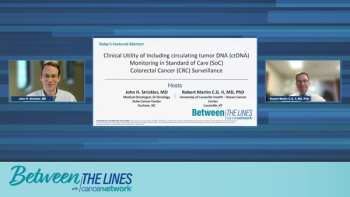Articles by John H. Strickler, MD

Experts discuss how the evolving landscape of patient access to medical information challenges clinicians to stay current and communicate effectively, while emphasizing the expanding role of circulating tumor DNA testing across multiple cancers—offering more precise, personalized treatment guidance and paving the way for earlier, targeted interventions that improve patient outcomes and quality of life.

Experts discuss that although financial concerns about ctDNA testing exist, they are generally manageable with patient education and transparent communication, and that incorporating ctDNA into formal clinical guidelines could reduce insurance barriers and alleviate patient anxiety, ultimately enabling broader access to this valuable personalized cancer monitoring tool.

Experts discuss how real-world data counter concerns that ctDNA testing increases patient anxiety, highlighting that most patients feel more reassured and confident in their care when receiving personalized ctDNA results, which supports its integration into routine surveillance to improve both clinical decision-making and patient quality of life.

Experts emphasize that sustained ctDNA negativity beyond 18 to 24 months enables safely extending surveillance intervals, easing patient burden while improving personalized colorectal cancer follow-up despite ongoing challenges with interpretation and insurance coverage.

Experts discuss how integrating ctDNA testing into standard colorectal cancer surveillance enhances early recurrence detection, improves eligibility for curative metastasis-directed therapies, and empowers more personalized, timely treatment decisions, ultimately improving both clinical outcomes and patient confidence.

Experts discuss how positive ctDNA results after chemotherapy can guide timely, metastasis-directed interventions in colorectal cancer, highlighting the shift from reliance on CEA to more sensitive molecular testing—and emphasizing the need for high-quality imaging to capitalize on ctDNA’s potential for enabling curative surgical outcomes.

Experts discuss how durable ctDNA negativity following colorectal cancer surgery is associated with exceptionally low recurrence risk—particularly beyond 2 years—supporting more relaxed surveillance strategies, improved quality of life, and evidence-based reassurance for patients entering long-term survivorship.

Experts discuss how ctDNA dynamics after colorectal cancer surgery can guide personalized surveillance and treatment, with recurrent positivity signaling high relapse risk and potential therapy resistance, whereas sustained negativity may support less intensive monitoring, balancing effective oversight with patient quality of life.

Experts discuss pooled data from international studies demonstrating the strong prognostic value of ctDNA monitoring in colorectal cancer surveillance, highlighting its ability to detect minimal residual disease and guide treatment decisions across diverse patient populations despite geographic differences in chemotherapy use.

Experts discuss the critical role of clear pathology communication and risk assessment after colorectal cancer surgery, highlighting how surgical quality, pathologic staging, and timely ctDNA testing guide personalized adjuvant therapy decisions and coordinated long-term surveillance to optimize patient outcomes.

Experts discuss the expanding role of ctDNA as a prognostic and predictive tool in colorectal cancer management, emphasizing its ability to personalize postoperative surveillance and treatment decisions—particularly in ambiguous clinical scenarios—while highlighting the need for sensitive assays and thoughtful communication around emotionally challenging results.

Experts discuss how postoperative surveillance after colorectal cancer surgery is increasingly personalized by integrating pathologic staging, surgical quality, and ctDNA testing to adjust monitoring intensity, with higher-risk or uncertain cases receiving more aggressive follow-up to optimize early detection and intervention.

Experts discuss the pivotal role of ctDNA in postoperative colorectal cancer care, using it alongside pathology and staging to personalize recurrence risk assessment and guide adjuvant therapy decisions, particularly in nuanced cases where ctDNA results and clinical risk factors may not align.

Experts discuss how initial postoperative visits after colorectal cancer surgery integrate pathology review, recurrence risk assessment, and timely ctDNA testing to personalize prognosis and guide surveillance, emphasizing the importance of surgical quality indicators and molecular tools in shaping follow-up care.

Experts discuss how postsurgical surveillance for colorectal cancer varies by setting, with multidisciplinary teams leading coordinated care in academic centers, whereas surgeons in rural or resource-limited areas often take on expanded roles to ensure follow-up and monitoring are not compromised.


